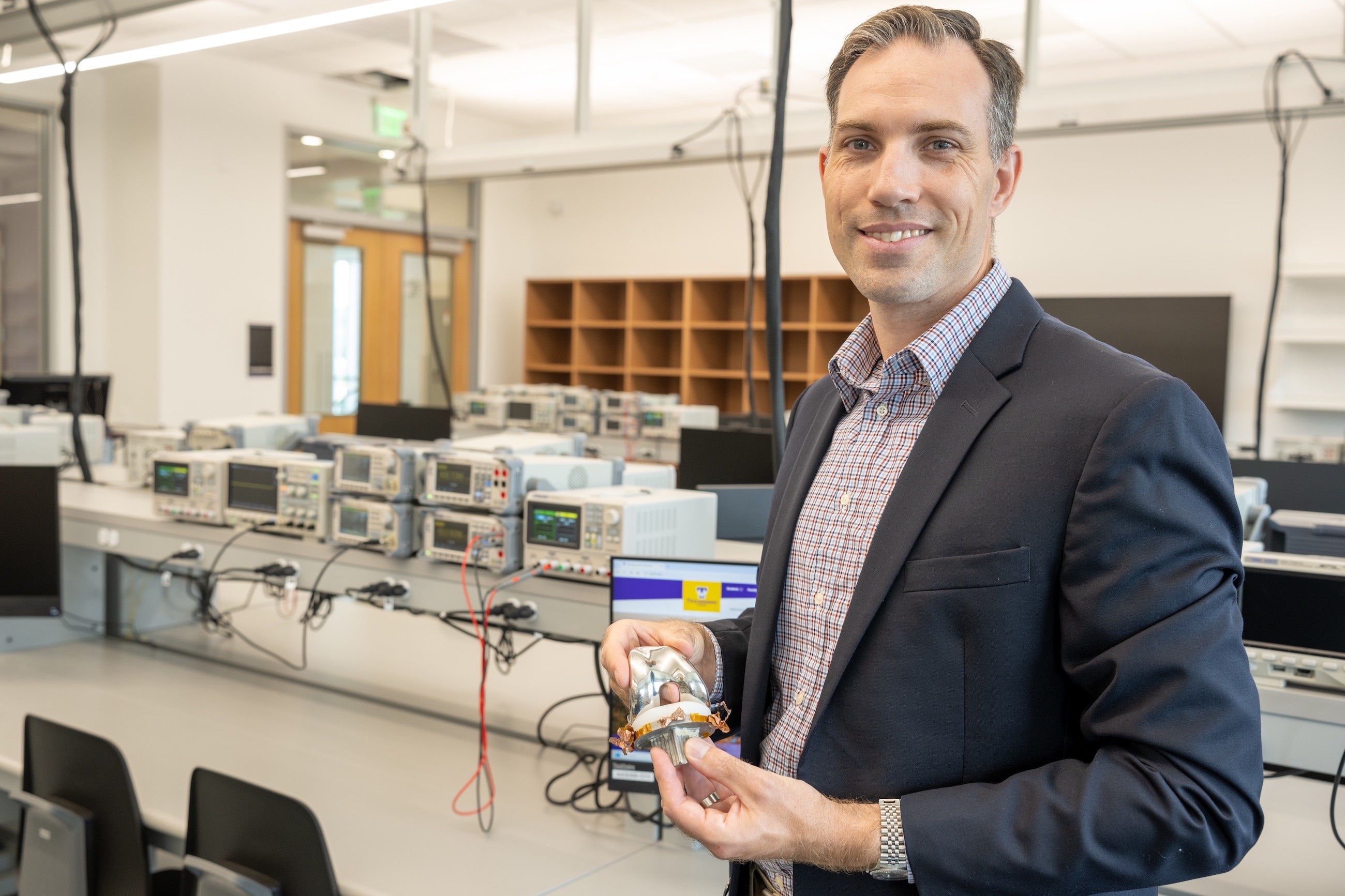Tennessee Tech associate professor lands $2.5 million NIH grant to improve knee replacement technology

Steven Anton, associate professor of mechanical engineering at Tennessee Tech, is
pictured with a prototype for the novel “smart knee” implant he is developing to improve
knee replacement technology. Anton’s research is now backed by a $2.5 million grant
from the National Institutes of Health (NIH).
More than 1 million Americans will undergo total knee arthroplasty, better known as knee replacement surgery, each year. A faculty member at Tennessee Tech University is on a mission to improve those surgical outcomes through advances in knee replacement technology – now with the help of a prestigious $2.5 million grant from the National Institutes of Health.
Steven Anton, associate professor of mechanical engineering and director of Tech’s Dynamic and Smart Systems Laboratory, has made modernizing knee replacement technology a focus of his research since coming to the university more than a decade ago.
While knee replacement surgery is successful for most patients, an estimated 10 to 20 percent of patients remain dissatisfied with their outcomes. Moreover, about nine percent of these surgeries require revision.
Anton saw the need to improve these surgeries firsthand when his late mother underwent a knee replacement. While she avoided post-operative complications that befall some patients, he recalls how her challenging road to recovery reaffirmed his belief that “we need to do better.”
“We need data from within the replaced joint to better understand why 10 to 20 percent of people are dissatisfied with their surgical outcomes, but there’s currently no FDA-approved means to implant technology into the knee and provide us with that information," said Anton. “That's the problem I'm trying to solve. As an engineer, my main motivation is to develop sensing systems that can give us a full picture of what is actually happening with people after the surgery so that we can improve knee replacement outcomes for patients.”
With the help of his students, Anton has been developing a self-powered “smart knee” implant that will let the replaced knee provide real-time data to doctors on the forces and motions in the joint to assess its performance.
While previous iterations of Anton’s research focused solely on utilizing piezoelectric transducers to sense joint forces and harvest energy, the new NIH grant will allow him to pursue a more sophisticated smart implant that will add magnetic sensors to assess the full range of motion in the knee.
The key to the smart knee is the embedded piezoelectric transducer array. When forces are applied to the piezoelectric transducers within the smart knee during normal activities of daily life, they generate voltages. The voltages can be measured to create a sensing system, but also harvested and stored to power the system.
As Anton forges ahead, he uses the task to create hands-on learning opportunities for his students – some of whom have even gone on to careers in research and development for the medical device industry.
“Ever since the beginning, students have been involved, both at the undergraduate and graduate level,” he explained. “Twenty-plus students have worked with me in one form or another on this project … It’s very student-centered.”
While the NIH issued a round of funding for Anton’s research in years past, the latest five-year grant represents a significantly larger investment and carries the NIH’s prestigious “R01” designation – the agency’s most sought-after research grant, which is awarded to less than 10 percent of applicants.
“The R01 is just a total dream come true,” said Anton. “If you had told me in 2013 when I started in the mechanical engineering department at Tech that I would eventually be able to secure a R01 and establish a biomedical research program, I wouldn’t have believed it.”
Anton says the grant shows that Tennessee Tech is emerging as a leader in biomedical research and can even go toe-to-toe with institutions that have the backing of medical schools and affiliated hospitals. The grant comes as Tech recently marked its fifth consecutive record-breaking year for externally funded research, reaching nearly $48 million in fiscal year 2025.
John Liu, interim provost at Tech, explained that research projects like Anton’s help solve real-world challenges while expanding experiential learning opportunities for students.
Michael Aikens, acting vice president for research and economic development at Tech, added that the university was “very proud of Dr. Anton for his high-quality research programs,” while noting that the R01 award is “a testimony that the faculty at Tennessee Tech are very competitive.”
The NIH grant is just the latest recognition in what has been a busy summer for Anton. Most recently, he was published by the American Society of Mechanical Engineers’ Mechanical Engineering Magazine, where he and fellow Tech professor Craig Henderson penned a collaborative whitepaper with PCB Piezotronics on the smart building technologies used in the university’s new Ashraf Islam Engineering Building.
For his part, Anton is quick to share credit with his Tech colleagues and students.
“I have had great support from this university–whether it’s our department, the Center for Manufacturing Research, the College of Engineering, or our university-wide Office of Research, it was truly a team effort,” he concluded. “I think it shows what we can all achieve when we band together, so I’m really grateful for everyone at Tennessee Tech.”

